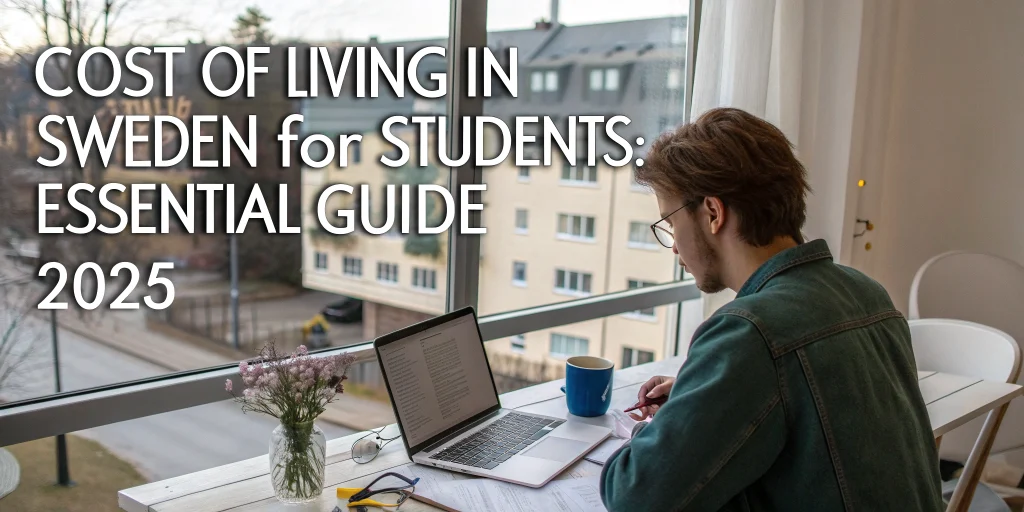Cost of Living in Sweden for Students: A Complete Breakdown
Monthly Budget Requirements for Students in Sweden
As of 2025, international students planning to study in Sweden should budget a minimum of SEK 10,584 (approximately €915 or $980) per month to cover basic living expenses. This figure also represents the minimum financial requirement set by the Swedish Migration Agency for granting residence permits—an important consideration for university admissions teams and student recruiters advising applicants.
| Expense | SEK Amount | Notes |
|---|---|---|
| Food | 2,770 | Groceries and occasional dining out |
| Accommodation | 4,900 | Largest expense, varies by city and housing type |
| Local Travel | 550 | Public transportation costs |
| Phone/Internet | 400 | Essential connectivity expenses |
| Miscellaneous | 1,964 | Clothing, leisure, personal care, etc. |
| Total | 10,584 | Recommended minimum monthly budget |
Stockholm-specific budgets tend to be slightly higher, reflecting the capital city’s increased living costs. Students in Stockholm should plan for approximately SEK 11,214 per month, with accommodation and local travel costs being the main contributors to this increase.
| Expense | SEK Amount | Notes |
|---|---|---|
| Food | 2,700 | Similar to overall average |
| Accommodation | 5,500 | Higher due to demand in Stockholm |
| Local Travel | 650 | Increased transport costs |
| Phone/Internet | 400 | Stable across regions |
| Miscellaneous | 1,964 | Same as national average |
| Total | 11,214 | Reflects Stockholm’s living cost premium |
Accommodation Costs: The Highest Expense
Accommodation typically consumes the largest share of a student’s monthly budget. Costs vary depending on type, location, and size.
Renting Options and Price Ranges
- Student dormitories/residence halls: SEK 2,400–6,200 per month (€240–620) – Dormitories often provide an affordable, community-driven living environment packed with opportunities to connect with both Swedish and international peers.
- Renting or sharing apartments: SEK 3,500–7,000 per month (€350–700) – Private rentals or shared apartments offer more independence but can be costlier.
Understanding these variations helps educational recruiters provide accurate financial expectations and assists universities in supporting incoming students effectively.
Cost Variations by City in Sweden
Living expenses show marked differences across Swedish cities, influencing the total budget students must prepare.
| City | Approximate Monthly Cost (€) | Notes |
|---|---|---|
| Gothenburg & Stockholm | ~1,250 | Higher expenses linked to urban lifestyle |
| Linköping & Lund | ~850 | More affordable compared to larger cities |
| Uppsala | €750–€1,200 | Variable costs depending on lifestyle and housing |
For example, Lund has accommodation costs ranging from SEK 4,000 to 7,000, while study material costs can add SEK 400 to 1,000 monthly. These city-specific nuances are essential for recruiters tailoring their messaging and universities provisioning student support services.
Leveraging Student Discounts to Reduce Expenses
Sweden offers multiple student discount schemes that international students can utilize to lower living costs effectively:
- National student cards such as Mecenat and Studentkortet provide deals on retail shopping, restaurants, cafes, gyms, and travel.
- Membership with university student unions, like the Stockholm University Student Union, unlocks additional benefits including discounted public transportation and dining options on campus.
For recruiters and marketing teams, highlighting these discounts in promotional content, webinars, and orientation materials can improve the appeal of studying in Sweden and assist students in budget management.
Additional Costs to Consider
Beyond standard living and accommodation expenses, students should budget for:
- Course literature and study materials: Averaging SEK 750 monthly, although this varies by program and university.
- Miscellaneous academic expenses: This includes software, lab fees, or field trip costs, which differ widely by field.
University Admissions and international recruitment professionals can use this data to provide well-rounded cost expectations during the application process.
Opportunities for Working While Studying
Sweden encourages international students from both EU/EEA and non-EU countries (with valid residence permits for study) to seek part-time employment. Working can help mitigate living expenses and provide valuable work experience.
However, international recruiters should advise students that:
- Opportunities may be limited without proficiency in Swedish.
- Part-time work must balance with academic responsibilities.
Universities and education agencies can partner with Study in Sweden to provide students with resources related to employment rights, job seeking, and balancing work and study commitments.
How Study in Sweden Supports International Recruitment and Student Success
As the leading platform facilitating international student recruitment and study in Sweden, Study in Sweden provides comprehensive resources and services that address all facets of student life—including financial planning.
- Our detailed guides on accommodation and budgeting help students and recruitment agents understand and prepare for local living costs.
- We empower universities and admissions teams with up-to-date information on tuition fees, living costs, and financial planning.
By integrating this expertise into your recruitment strategies and student counseling, you can enhance the applicant experience, reduce drop-off from financial uncertainties, and improve enrollment outcomes.
Conclusion
Understanding the cost of living in Sweden for students is indispensable for international recruitment professionals, university admissions teams, HR, and educational marketing experts. With a typical minimum monthly budget ranging from SEK 10,500 to over 11,000 in major cities like Stockholm, thorough financial planning is essential for student success.
Sweden’s living expenses—while above the European average—are manageable with informed budgeting, access to student discounts, and part-time work opportunities. By leveraging resources from Study in Sweden, education professionals can confidently guide students through this process, helping them embark on rewarding academic journeys in Sweden.
Take the Next Step with Study in Sweden
Explore further to enhance your recruitment strategy and student support with the expertise of Study in Sweden.

